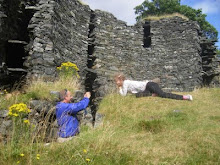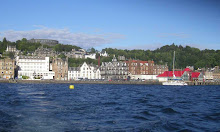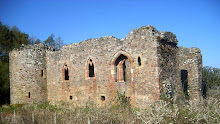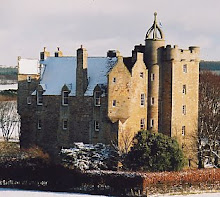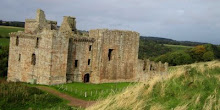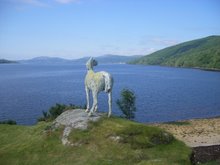Two Mackintoshes from Pennsylvania were here last weekend searching for their roots. The Mackintoshes were traditional leaders of Clan Chattan (pronounced 'hatton') a confederacy of small clans, based south of Inverness.
Whilst doing a little research for the trip I came upon the signing of the 'Clan Chattan Band of Union' at Termit in 1609, and the stone laid to commemorate this event in 2009.
Termit? Try it in in Google and it suggests you mean 'termite'. Look on the map and it isn't there!
Well, now I can reveal to anyone who is interested that Termit (no buildings remaining) is about five miles east of Inverness on land now known as Moraystoun. The stone is accessible at Grid 753488 and, as you can see, it is looking well in the landscape.
Amongst the constituent Clan Chattan clans are: Mackintosh, Shaw, MacLean of Dochgarroch, MacGillivray, MacQueen, MacPherson, Davidson, MacBean, MacThomas, MacPhail, Cattanach, Ritchie, MacCombie and Farquharson.
So why did these smaller clans feel the need to band together? The official explanation in the Clan Chattan newsletter is here. More generally, I would suggest that since James VI, King of Scots, had recently accepted the throne of England, royal control of the Highlands was increasingly arm's length. The Gordons, the Frasers, the Camerons and the MacDonalds were all big beasts in the north. The smaller clans had to come together, or risk being eaten up.
Clan Chattan led the Highland Charge at Culloden in 1746.
Friday, May 21, 2010
Friday, April 30, 2010
Étienne Jacques Joseph Alexandre Macdonald, Maréchal d'Empire, Duc de Tarente.
At Howbeg on South Uist today there was a ceremony to mark the unveiling of a plaque to the memory of one of Napoleon Bonaparte's most distinguished generals: Marshall MacDonald.
(I am obliged to Uist Lady for the picture).
The Maréchal's father Neil MacEachen was born on South Uist. A studious young man, MacEachan went off to the Scots College in Paris to study for the priesthood. He returned to find the 1745 Rising in full swing. It seems that he fought at Culloden; what is certain is that he was on that boat which carried 'Bonnie Prince Charlie' over the sea to Skye. MacEachen then stayed with the prince as escort/servant, until they eventually reached France and he had to make his own way in an unfamiliar world. Probably because no one could pronounce his name, he changed it to MacDonald and he joined a community of exiled and impoverished Jacobites at Sancerre. Later the family came along.
Little could poor Neil, whose wife took in washing and did cleaning jobs, have imagined what would happen 34 years later. In 1799: the new French Republic's wars against Britain, Russia and the Austrian Empire were not going well. A faction decided to mount a coup d'état and they needed a general to head it. According to author Jean Didier Hache who has written a book on MacDonald, the first choice general died in Italy, the second choice refused and the third choice was
MacDonald.
MacDonald refused. Napoleon Bonaparte willingly accepted!
In 1825 MacDonald returned to Uist to see his father's birthplace, but having no Gaelic and very little English, the visit did not forge much in the way of ties with the island. He did however return with some good Scottish earth which was buried with him on his death fifteen years later.
We often boast of enlightened18th century Scots who were world leaders in science, medecine, philosophy. It would have been quite nice to have had an Emperor too!
(I am obliged to Uist Lady for the picture).
The Maréchal's father Neil MacEachen was born on South Uist. A studious young man, MacEachan went off to the Scots College in Paris to study for the priesthood. He returned to find the 1745 Rising in full swing. It seems that he fought at Culloden; what is certain is that he was on that boat which carried 'Bonnie Prince Charlie' over the sea to Skye. MacEachen then stayed with the prince as escort/servant, until they eventually reached France and he had to make his own way in an unfamiliar world. Probably because no one could pronounce his name, he changed it to MacDonald and he joined a community of exiled and impoverished Jacobites at Sancerre. Later the family came along.
Little could poor Neil, whose wife took in washing and did cleaning jobs, have imagined what would happen 34 years later. In 1799: the new French Republic's wars against Britain, Russia and the Austrian Empire were not going well. A faction decided to mount a coup d'état and they needed a general to head it. According to author Jean Didier Hache who has written a book on MacDonald, the first choice general died in Italy, the second choice refused and the third choice was
MacDonald.
MacDonald refused. Napoleon Bonaparte willingly accepted!
In 1825 MacDonald returned to Uist to see his father's birthplace, but having no Gaelic and very little English, the visit did not forge much in the way of ties with the island. He did however return with some good Scottish earth which was buried with him on his death fifteen years later.
We often boast of enlightened18th century Scots who were world leaders in science, medecine, philosophy. It would have been quite nice to have had an Emperor too!
Saturday, April 24, 2010
1776 and 1746
Home yesterday after a great trip to the USA but, due to volcanic ash, eight days later than scheduled. My distraction as I travelled (and waited) was a book from a second-hand bookshop in Kennett Square, Pennsylvania: '1776' by David McCullough, a remarkable account of the tough campaigning of that year - first steps on the road to a United States of America.
I'm sure numerous people have made the connection between George Washington's brave but ill-equipped army and that of Prince Charles Edward who had faced the same enemy thirty years earlier in an attempt to recover the throne for the Stuarts. Both armies were short of money, food, equipment, gunpowder, cavalry, artillery, just about everything. Both leaders appealed to the hearts and loyalty of their soldiers, both suffered from desertion by those who felt they should be tending their crops. The main difference, of course, was in the generalship: Washington may occasionally have been indecisive but, unlike Bonnie Prince Charlie, he was a natural leader who was prepared to listen to advice.
Washington, who struggled to keep the Yankees, the New Englanders and the Virginians together, would have been appalled at the three day horror which was Gettysburg. I spent a fascinating day there and was struck by the statistic that total casualties at Gettysburg were more than three times larger than the total combatants at Culloden.
Returning to Newark we crossed the Delaware at Trenton, where a brilliant Christmas Eve night manoeuvre by Washington changed the course of the war. Charlie's last-throw night march on the eve of Culloden similarly expected to find the enemy drunk. But the Highland Army arrived when the porridge was already on the boil, and they returned to camp exhausted.
When I am next at Culloden I will be much better able to answer questions from American visitors who are looking for familiar yardsticks for the history they are learning in Scotland.
I'm sure numerous people have made the connection between George Washington's brave but ill-equipped army and that of Prince Charles Edward who had faced the same enemy thirty years earlier in an attempt to recover the throne for the Stuarts. Both armies were short of money, food, equipment, gunpowder, cavalry, artillery, just about everything. Both leaders appealed to the hearts and loyalty of their soldiers, both suffered from desertion by those who felt they should be tending their crops. The main difference, of course, was in the generalship: Washington may occasionally have been indecisive but, unlike Bonnie Prince Charlie, he was a natural leader who was prepared to listen to advice.
Washington, who struggled to keep the Yankees, the New Englanders and the Virginians together, would have been appalled at the three day horror which was Gettysburg. I spent a fascinating day there and was struck by the statistic that total casualties at Gettysburg were more than three times larger than the total combatants at Culloden.
Returning to Newark we crossed the Delaware at Trenton, where a brilliant Christmas Eve night manoeuvre by Washington changed the course of the war. Charlie's last-throw night march on the eve of Culloden similarly expected to find the enemy drunk. But the Highland Army arrived when the porridge was already on the boil, and they returned to camp exhausted.
When I am next at Culloden I will be much better able to answer questions from American visitors who are looking for familiar yardsticks for the history they are learning in Scotland.
Monday, April 12, 2010
Vatted Whiskies of the 19th and 21st Centuries
 I have written before about Usher's Old Vatted Glenlivet - and proudly so, since Andrew Usher after whom it is named, happens to be my Great Grandfather. I explained then that the much used phrase 'single malt' is relatively meaningless nowadays since the days of vatted malts (a blend of malt whiskies) are long gone. Vatted malts were a great idea in the 19th century when independent (and recently legalised) distilleries across the Highlands produced wildly different products - some light and fiery, others heavy, peaty and a bit like cough mixture. Andrew Usher (amongst others) combined these different whiskies to produce a drink that was acceptable to the southern market. Nowadays malt whiskies differ, but all are more than palatable in their own right.
I have written before about Usher's Old Vatted Glenlivet - and proudly so, since Andrew Usher after whom it is named, happens to be my Great Grandfather. I explained then that the much used phrase 'single malt' is relatively meaningless nowadays since the days of vatted malts (a blend of malt whiskies) are long gone. Vatted malts were a great idea in the 19th century when independent (and recently legalised) distilleries across the Highlands produced wildly different products - some light and fiery, others heavy, peaty and a bit like cough mixture. Andrew Usher (amongst others) combined these different whiskies to produce a drink that was acceptable to the southern market. Nowadays malt whiskies differ, but all are more than palatable in their own right. And so it was with some surprise that I found at 'Whisky Live' (part of Scotland Week in New York) last week nothing less than a new range of vatted malts. They are produced by the Compass Box Whisky Company of Edinburgh. I had a taste of their 'Spice Tree' which was excellent. I am also intrigued by Lady Luck (pity it costs £125!). This type of blending is very sophisticated and a great addition to the whisky story. Good luck to them!
And so it was with some surprise that I found at 'Whisky Live' (part of Scotland Week in New York) last week nothing less than a new range of vatted malts. They are produced by the Compass Box Whisky Company of Edinburgh. I had a taste of their 'Spice Tree' which was excellent. I am also intrigued by Lady Luck (pity it costs £125!). This type of blending is very sophisticated and a great addition to the whisky story. Good luck to them!As an addendum, the Scottish whisky blenders - Andrew Usher, John Dewar, Arthur Bell, Johnnie Walker and others - really made their fortune as a result of the Great French Wine Blight. In the mid nineteenth century on verandahs throughout the world (and certainly in the USA) gentlemen were accustomed to drinking a brandy and soda before dinner. When the blight meant no french brandy a vast new market opened up for the whisky blenders from Scotland.
Aye, it's an ill wind...
Thursday, March 11, 2010
Why did Charlie want to go to Skye anyway?

Speed, bonnie boat, like a bird on the wing,
Onward! the sailors cry;
Carry the lad that's born to be King
Over the sea to Skye.
There are two big clans on Skye - the MacDonalds and the MacLeods. When guiding out there I'm oddly reluctant to reveal that neither one supported the Jacobites in 1745, indeed that both chiefs signed up to support the government. Bonnie Prince Charlie arrived on Skye on 29 June 1746, disguised as Flora MacDonald's
arrived on Skye on 29 June 1746, disguised as Flora MacDonald's maid, piloted by Donald MacLeod of Galtrigal. One of the men tasked to search for him was the 22nd Chief of Clan MacLeod; another was Lieut. Alexander MacLeod of Talisker who commanded the local militia (and dined with Flora at Monkstadt on the night she arrived on Skye!).
maid, piloted by Donald MacLeod of Galtrigal. One of the men tasked to search for him was the 22nd Chief of Clan MacLeod; another was Lieut. Alexander MacLeod of Talisker who commanded the local militia (and dined with Flora at Monkstadt on the night she arrived on Skye!).
So why on earth did Charlie want to come to Skye? In short, government troops were closing in on him too fast on South Uist...where one of those meant to be searching for him was Flora's stepfather, Hugh MacDonald of Armadale, who was actually in on the plot to save him! It's complicated. Although the chiefs, and perhaps most men, were prepared to put their backs into finding Charlie (hoping to claim the reward of 30,000 guineas if they succeeded), there were enough loyal individuals to ensure his safety.
You see. Like everything to do with the Jacobites, it's complicated! But Pauline, our wonderful Clan Tour guide, will make it all seem quite simple!
Subscribe to:
Comments (Atom)



















































